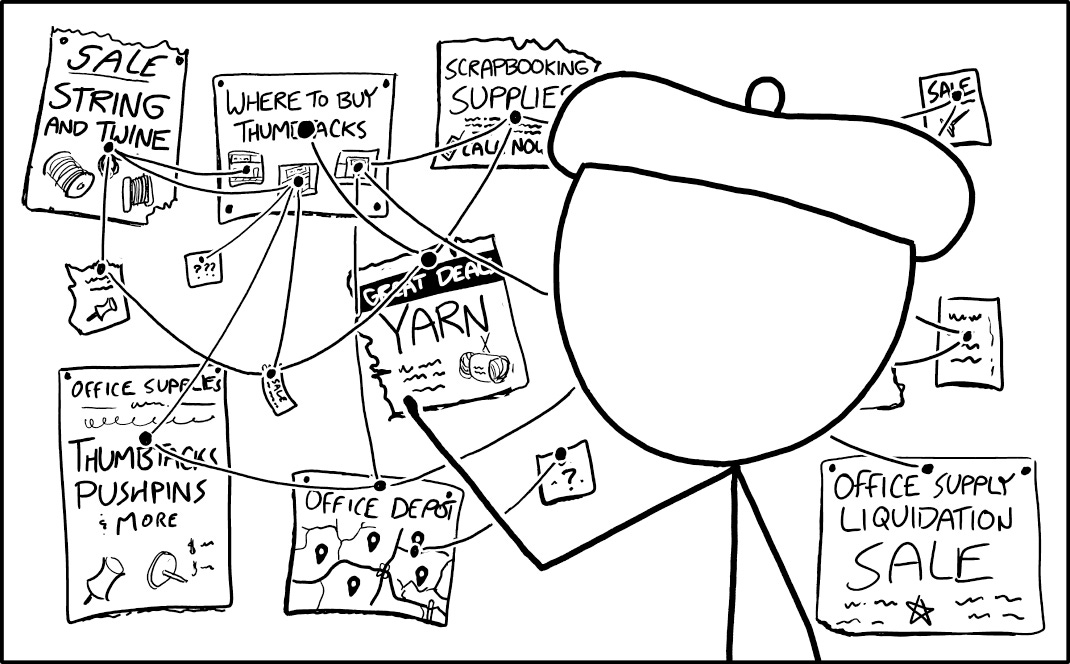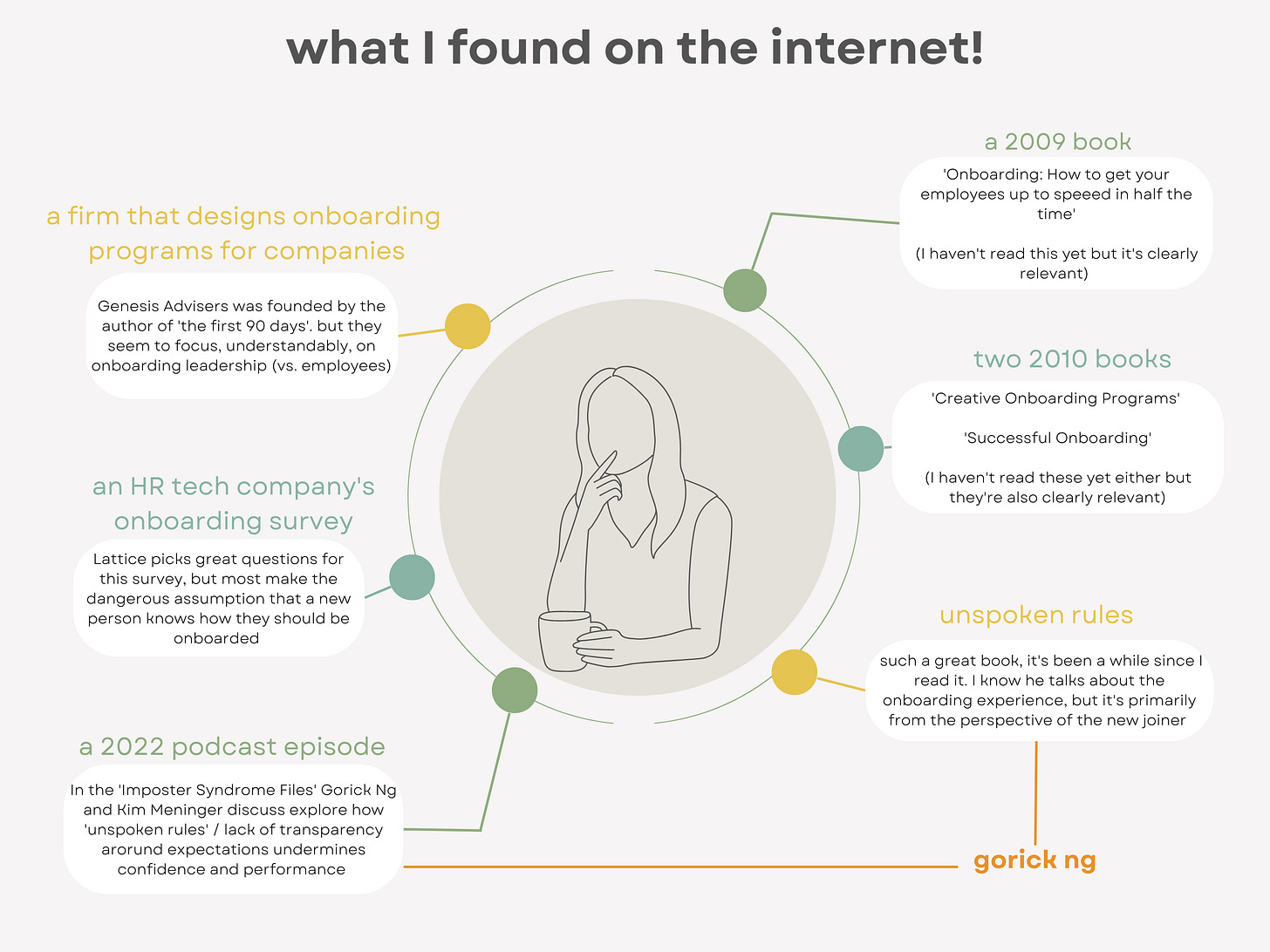2 | OnBored: Let's pull out the whitebored.
I map out what We (the internet) knows about employee onboarding

Disclaimer: None of the thoughts expressed in my blog reflect those of BCG, LSE, Harvard, Douglasvillle Georgia, my ancestors, etc. In fact, the older this post is, the more likely it is that this no longer reflect those of myself.
Are there other conversations people are having about onboarding programs?
To find out, I looked for books, people, companies exploring this topic:
What books are there?
Any researchers or thought leaders in this space?
Gorick Ng, author of Unspoken Rules, speaks about the ‘curse of expertise’ which impacts onboarding processes
Any companies helping other companies create/fix onboarding?
Genesis Advisers, cofounded by author of The First 90 Days
Lattice, popular HR company, has a list of onboarding questions
Should I limit my questions to the context of corporate onboarding programs?
I'm deciding to, but if anyone reading this thinks this is a bad idea, please let me know. There’s nothing I read to back this up, but it makes sense for me to do this given the people/resources/experiences I have are highly concentrated in corporate environments.
What’s within our realm of control when designing onboarding programs? What isn’t? In other words, what’s worth me questioning/challenging vs. assuming is an inherent challenge (i.e. letting go).
It’s hard to find material on this, to be honest. Gorick’s interview with Kim Meninger on her podcast “Imposter Syndrome Files” about the ‘curse of expertise’ seems to touch on this. That’ll be what I dig into next. Here is the link. I’ve written some reflection/responses to this below:
A few notes (paraphrased) from Gorick and Kim’s conversation:
“So much of what’s expected of us is never actually communicated to us.” Yes!
You’re expected to be competent, committed, and compatible… but what does that mean in every context? And how do you make sure you’re not over-indexing on any of these.
“Why aren’t we solving the problem? (a) heart: curse of knowledge; you have to learn from someone who’s novel, who’s just been introduced to the org (b) head: people don’t understand connection between seeing the unspoken rules and the bottom line.”
Gorick said those who benefit from his book is anyone who feels like an outsider (e.g. male nurse on a female team, new immigrants, expats).
I really loved Kim’s response to this: “I think I have two thoughts in response to that. Number one is that ‘being an outsider’ is something that can be episodic in our lives. So maybe we don’t feel that way in this very moment because we’ve gotten comfortable where we are, but there’s no guarantee that we won’t be in this situation at another point in time.
And so it’s important to really think about what you, what might be coming down the road and be more proactive in our thinking.
The other thing I think about is the invisible people who are being left behind for you know, I don’t mean to sound disrespectful, but just to sort of characterize the people who are most impacted by this, are also probably least likely to ask for help because of that fear of, I don’t want to expose the fact that I don’t know what I’m doing.
I’m really self-conscious about this. And so do you have tips? And probably the first one is read the book…”
Gorick responds to Kim by suggesting ways to frame questions as closed-ended to demonstrate one’s own effort to find the answer - which contributes to how others perceive a new person’s 3 C’s (competence, commitment, and compatibility).
Gorick: “My message to leaders is, look at your team, and ask yourself, who are the people who seem the quietest? Who seem the least engaged? Who seem like they just don’t get it? And assume positive intent for a moment and ask yourself, okay, no one wakes up in the morning telling themselves how can I make the life of my manager as difficult as possible? Everyone wants to do good work. Everyone wants to be their best self. Let’s just assume that for a moment. What unspoken rule do they not get that is leading them down this path of not knowing what they don’t know? And what can you as a leader do to just have a conversation with them about it? Say when I was in your shoes, this is what I encountered. These are my struggles. This is how I encountered it. Just having that conversation and sharing your own story can mean the difference between this person not only just being invisible but feeling alone and potentially being one of your high performers.”
My Questions and Reactions
High Level Question:
How can we mitigate the impact of the ‘curse of knowledge’ that makes it hard for leaders to anticipate the needs, questions, fears, hopes of new employees?
Tactical Question:
There are some questions that you may not know are google-able or not. Could these questions be helpful data points for managers who are victim to ‘the curse of knowledge’. Especially the open ones…
Whose responsibility is it to get new people ‘up to speed’?
Kim: “I always try to look at it from what’s our individual responsibility. And what’s our collective responsibility for solving the problem at a more macro level? And I think for anyone who’s listening who manages people, it’s such a great thing to think about is, am I being clear? Am I taking things for granted? Am I making assumptions about what this other person knows or understands? And to just really err on the side of, especially in the beginning, over-communicating what those expectations are. I often joke but I mean, this seriously, when I talk about impostor syndrome, I say manage your team as if everyone has impostor syndrome because most of them do, and no one will ever tell you, right? And so it’s the same thing. Assume that nobody knows these rules, that you now assume that it’s a blank slate. And you can use your own authentic style in how you communicate these and how you engage your team. But I think you’re going to end up having a much more productive, much more engaged team, if you start with the premise that they have a lot that they don’t have, there’s a lot that they don’t have access to.”
How would you even begin to know if you’re being clear or taking things for granted if you’re not in constant communication with new people to know what they do and don’t know?
We know that with more power, the harder it is to exchange perspectives. What can We (capital w We; leaders, employees, HR folks, ethicists, linguists, technologists, parents…) do about this? Anything?
and finally… what questions are worth exploring over the next week?
I’m very curious about this question of ‘responsibility’. Are individuals responsible or is leadership responsible for people being able to ask the right questions?
Is anyone else talking about this question of responsibility? In other discliplines/areas?
Where do *I* think this coversation should start?
Off the top of my head, I think it should start in political philosophy. This question seems similar to questions about social mobility. Should the poor lift themselves up, is it others responsibility to lift up the poor, or do we split the responsibility? Who decides? And how? I wonder if the same questions can apply to the information-poor or social-capital-poor new hire.







In past roles, having a patient mentor/manager who understood my (in)experience level was so helpful. From that perspective, over-communication during onboarding seems great
Love this thread mostly because I think of this as an equity design problem and opportunity that is the cornerstone of my social equity consulting practice!!! - HMJ